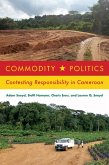Responsibility is political. As the international community has called for more responsible environmental, social, and governance performance, the politics of commodities has become more fraught. Commodity Politics cuts through the new rhetoric of responsibility and presents innovative research from Cameroon to provide a better understanding of the political complexity surrounding commodity production and trade in the twenty-first century.Assessing the perspectives of businesses, international organizations, governments, and civil society groups, the authors offer insights gleaned from years of field research in a commodity-dependent country. Commodity Politics presents case studies of sugar, palm oil, cocoa, and the Chad-Cameroon pipeline project. These cases uncover a problematic politics that is much broader than the implications of corporate social responsibility codes for people and the planet, delivering solid rationales for policy-makers and commodity stakeholders to think more deeply about investor-driven approaches to improving environmental, social, and governance conduct. This book trains students and scholars to better recognize political intricacies and consequential flash points.Immersing its readers in timely debates over the meaning and intent of responsibility, Commodity Politics breaks new ground in the political analysis of development.
Dieser Download kann aus rechtlichen Gründen nur mit Rechnungsadresse in A, B, BG, CY, CZ, D, DK, EW, E, FIN, F, GR, HR, H, IRL, I, LT, L, LR, M, NL, PL, P, R, S, SLO, SK ausgeliefert werden.









